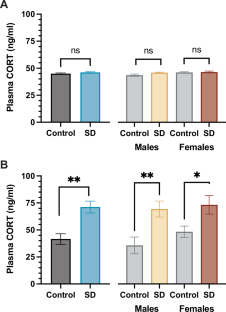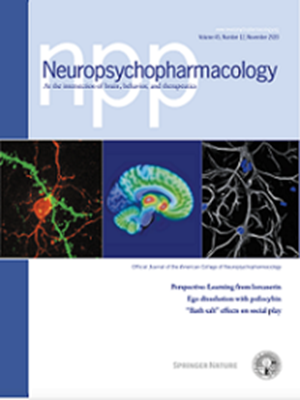急性睡眠中断会减少雌雄小鼠的恐惧记忆
IF 6.6
1区 医学
Q1 NEUROSCIENCES
引用次数: 0
摘要
睡眠问题是包括创伤后应激障碍(PTSD)在内的精神疾病的一个显著特征。尽管睡眠具有潜在的重要性,但人们并不了解睡眠在创伤相关疾病的发展和/或恢复中的作用。有趣的是,有报道称,创伤经历后立即中断睡眠可减少恐惧记忆,这种效应可用于人类治疗。虽然这种效应的机制还不完全清楚,但这些发现的一个可能解释是,立即中断睡眠会干扰恐惧记忆的巩固,使其变得更弱,对干预措施更敏感。在这里,我们让恐惧条件反射小鼠在恐惧条件反射后立即睡眠,睡眠时间(18 小时)包括并超过了通常与记忆巩固相关的时间段,然后再让它们接受 6 小时的睡眠干扰。在睡眠中断后立即进行的测试以及 24 小时后进行的测试中,接受这种延迟疗法的小鼠的恐惧感显著降低。这种睡眠中断方案还提高了杏仁基底外侧(BLA)编码脑源性神经营养因子(BDNF)mRNA的水平,BDNF是一种与神经可塑性有关的分子,而杏仁基底外侧是一个与恐惧及其消退有关的脑区。这些发现提出了一种可能性,即我们的延迟睡眠中断疗法所产生的影响并非由于记忆巩固受到破坏,而是由于杏仁核基底外侧(BLA)内由 BDNF 介导的神经适应性主动抑制了恐惧的表达。安全地减少恐惧记忆表达的治疗方法在治疗创伤引发的疾病方面具有相当大的治疗潜力。本文章由计算机程序翻译,如有差异,请以英文原文为准。


Acute sleep disruption reduces fear memories in male and female mice
Sleep problems are a prominent feature of mental health conditions including post-traumatic stress disorder (PTSD). Despite its potential importance, the role of sleep in the development of and/or recovery from trauma-related illnesses is not understood. Interestingly, there are reports that sleep disruption immediately after a traumatic experience can reduce fear memories, an effect that could be utilized therapeutically in humans. While the mechanisms of this effect are not completely understood, one possible explanation for these findings is that immediate sleep disruption interferes with consolidation of fear memories, rendering them weaker and more sensitive to intervention. Here, we allowed fear-conditioned mice to sleep immediately after fear conditioning during a time frame (18 h) that includes and extends beyond periods typically associated with memory consolidation before subjecting them to 6-h of sleep disruption. Mice exposed to this delayed regimen showed dramatic reductions in fear during tests conducted immediately after sleep disruption, as well as 24 h later. This sleep disruption regimen also increased levels of mRNA encoding brain-derived neurotrophic factor (BDNF), a molecule implicated in neuroplasticity, in the basolateral amygdala (BLA), a brain area implicated in fear and its extinction. These findings raise the possibility that the effects of our delayed sleep disruption regimen are not due to disruption of memory consolidation, but instead are caused by BDNF-mediated neuroadaptations within the BLA that actively suppress expression of fear. Treatments that safely reduce expression of fear memories would have considerable therapeutic potential in the treatment of conditions triggered by trauma.
求助全文
通过发布文献求助,成功后即可免费获取论文全文。
去求助
来源期刊

Neuropsychopharmacology
医学-精神病学
CiteScore
15.00
自引率
2.60%
发文量
240
审稿时长
2 months
期刊介绍:
Neuropsychopharmacology is a reputable international scientific journal that serves as the official publication of the American College of Neuropsychopharmacology (ACNP). The journal's primary focus is on research that enhances our knowledge of the brain and behavior, with a particular emphasis on the molecular, cellular, physiological, and psychological aspects of substances that affect the central nervous system (CNS). It also aims to identify new molecular targets for the development of future drugs.
The journal prioritizes original research reports, but it also welcomes mini-reviews and perspectives, which are often solicited by the editorial office. These types of articles provide valuable insights and syntheses of current research trends and future directions in the field of neuroscience and pharmacology.
 求助内容:
求助内容: 应助结果提醒方式:
应助结果提醒方式:


